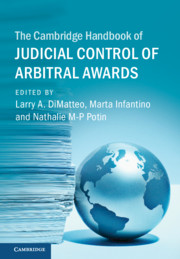Book contents
- The Cambridge Handbook of Judicial Control of Arbitral Awards
- The Cambridge Handbook of Judicial Control of Arbitral Awards
- Copyright page
- Dedication
- Concise Contents
- Contents
- Contributors
- Preface
- Part I Vacating Commercial Arbitration Awards
- Part II Enforcing Commercial Arbitration Awards
- Part III Scope and Interpretation of Arbitration Clauses
- Part IV Judicial Control of Arbitral Awards
- 10 Judicial Control of Arbitral Awards in Argentina
- 11 Judicial Control of Arbitral Awards in Australia
- 12 Judicial Control of Arbitral Awards in Bulgaria
- 13 Judicial Control of Arbitral Awards in Mainland China
- 14 Certain Aspects of Judicial Control of Arbitral Awards in France
- 15 Commercial Arbitration in Germany
- 16 Judicial Control of Arbitral Awards in Italy
- 17 Judicial Control of Arbitral Awards in Nigeria
- 18 Judicial Control of Arbitral Awards in Poland
- 19 Judicial Control of Arbitral Awards in Russia
- 20 Judicial Control of Arbitral Awards in Spain
- 21 Judicial Control of Arbitral Awards in Switzerland
- 22 Judicial Control of Arbitral Awards in Ukraine
- 23 Judicial Control of Arbitral Awards in the United Kingdom
- 24 Judicial Control of Arbitral Awards in the United States
- Part V Summary and Findings
19 - Judicial Control of Arbitral Awards in Russia
from Part IV - Judicial Control of Arbitral Awards
Published online by Cambridge University Press: 08 October 2020
- The Cambridge Handbook of Judicial Control of Arbitral Awards
- The Cambridge Handbook of Judicial Control of Arbitral Awards
- Copyright page
- Dedication
- Concise Contents
- Contents
- Contributors
- Preface
- Part I Vacating Commercial Arbitration Awards
- Part II Enforcing Commercial Arbitration Awards
- Part III Scope and Interpretation of Arbitration Clauses
- Part IV Judicial Control of Arbitral Awards
- 10 Judicial Control of Arbitral Awards in Argentina
- 11 Judicial Control of Arbitral Awards in Australia
- 12 Judicial Control of Arbitral Awards in Bulgaria
- 13 Judicial Control of Arbitral Awards in Mainland China
- 14 Certain Aspects of Judicial Control of Arbitral Awards in France
- 15 Commercial Arbitration in Germany
- 16 Judicial Control of Arbitral Awards in Italy
- 17 Judicial Control of Arbitral Awards in Nigeria
- 18 Judicial Control of Arbitral Awards in Poland
- 19 Judicial Control of Arbitral Awards in Russia
- 20 Judicial Control of Arbitral Awards in Spain
- 21 Judicial Control of Arbitral Awards in Switzerland
- 22 Judicial Control of Arbitral Awards in Ukraine
- 23 Judicial Control of Arbitral Awards in the United Kingdom
- 24 Judicial Control of Arbitral Awards in the United States
- Part V Summary and Findings
Summary
The USSR was one of the first states to ratify the New York Convention on the recognition and enforcement of foreign arbitral awards.1 The Soviet organizations complied with the foreign arbitral awards by strictly following the rules of contract and procedural discipline appropriate to a centralized economy. With the demise of Soviet Union, the need for procedural means of the recognition and enforcement of foreign arbitral awards in the national procedural law arose. A 1988 Decree of the Presidium of the USSR Supreme Soviet2 officially implemented provisions of the New York Convention into national law. In 1993, the Russian Federation adopted International Commercial Arbitration Law (hereinafter ICAL) based on the UNCITRAL Model Law of 1985.3 The ICAL granted competence to arbitration associations over disputes between companies with foreign participation and those disputes between such companies and Russian companies.4 The disputes between Russian companies were not subject to the New York Convention. This was addressed by the enactment of the 2002 Russian Federation Commercial Procedure Code (CPC) on arbitral tribunals, which established a legal framework for domestic arbitration that followed international rules on the recognition and enforcement of arbitral awards.5 With the adoption of the CPC, the Russian system of international and domestic arbitration was made comprehensive.6
Keywords
- Type
- Chapter
- Information
- The Cambridge Handbook of Judicial Control of Arbitral Awards , pp. 306 - 319Publisher: Cambridge University PressPrint publication year: 2020
- 1
- Cited by

